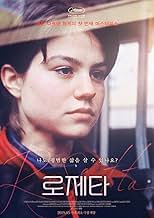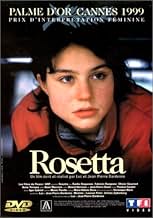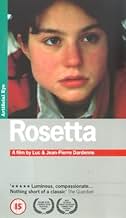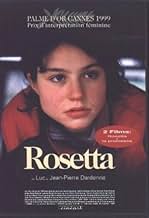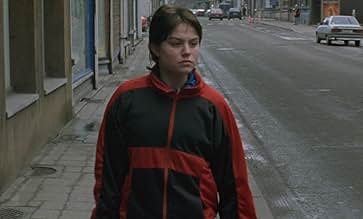Rosetta
- 1999
- Tous publics
- 1h 35min
NOTE IMDb
7,4/10
17 k
MA NOTE
La jeune et impulsive Rosetta vit avec sa mère alcoolique. Mue par le désespoir, elle est prête à tout pour conserver un emploi.La jeune et impulsive Rosetta vit avec sa mère alcoolique. Mue par le désespoir, elle est prête à tout pour conserver un emploi.La jeune et impulsive Rosetta vit avec sa mère alcoolique. Mue par le désespoir, elle est prête à tout pour conserver un emploi.
- Réalisation
- Scénario
- Casting principal
- Récompenses
- 10 victoires et 7 nominations au total
Leon Michaux
- First Policeman
- (as Léon Michaux)
Avis à la une
Sometimes you see a work of art and it knocks you out - it's all you can do for days and days to come to get it out of your mind. And you try to find a way in your mind to bring yourself closer to it, immerse yourself in it. You'll read everything about it that you can, try to find some more of the artist's work, find everything you can to do with it. All this to try and replicate the feeling that you experienced when you first encountered the piece. This is the effect that I've been trying to achieve since I saw Rosetta at 1999's London Film Festival.
Though some have attributed Rosetta's success at Cannes to the last-day syndrome; whereby the film that stays freshest in the panel's minds is the one that wins, it smacks of cavilling to suggest that this is the reason behind Rosetta's success - the simple fact is that it's a remarkable film which was only seriously rivalled this year by Almodovar's All About My Mother. Ignorance and snobbery have constantly been at work when Rosetta has been considered by critics, since it's a film which has divided the critics.
Top of the list of things-to-hate about Rosetta is the Dardennes' decision to shoot hand-held, an objection which I can understand but barely comprehend. Rosetta is a film which follows its heroine. Therefore, by mounting the camera almost on her shoulders, we see the world as she sees it, just as we see the world as she thinks it throughout the rest of the film. Most perfect is a scene when she is lying in bed at the house of Ricquet, her (only) friend, when she reassures herself that she's normal, she's found a friend, a *true* job and that she won't fall into the hole. Seldom is a more perfect and more touching marriage and explanation of the inner-self and its outer-conflicts achieved? - it's just magnificent cinema.
Rosetta is a fighter, but although her conflicts are with individuals, in a literal, physical sense, the metaphorical struggle is with the societal brick wall which she comes up against when trying to forge 'une vie normale' for herself. She's fighting against society for the right to live a life; she's fighting against society for a modicum of dignity. In this way, Rosetta is both existentialist and political, though never overtly, much to the credit of the Dardenne Brothers, since Rosetta is a 'universal' film.
The question which Rosetta poses is how we can release ourselves from the trouble we are in. Rosetta believes, and has been taught to believe (ironically, by society) that the way that she can achieve this dignity is by getting a 'true' job - so much so that she phones her boss to tell him that she won't be at work before her suicide attempt. She doesn't see that it's through Ricquet, not through having a job (his job) that she stands the best chance of forging a true identity, a true life and true dignity.
Rosetta is, in effect, just a proletarian hero, fighting society for the right to live and the right to work. However, to see the film in this way is reductionist in the extreme and is self-defeating. Rosetta is, above all, an individual. Her victory is to see that she has a friend who was there all along, and this gives us a remarkable ending that is full of drama; packs a considerable emotional punch and is unforgettable, thanks especially to a stunningly naturalistic performance by Emilie Dequenne, who won an award at Cannes for her portrayal of Rosetta. Her interpretation of the eponymous heroine lends so much to the film that she is as much responsible for the brilliance of the film as the directors are.
This film will never be a hit with middle-class and middle-class, middle-brow critics it in the same way that Schindler's List and The English Patient were; the bourgeoisie never want to get their hands dirty. It's their loss; Rosetta is quite simply one of the most wonderful films you'll ever see.
Though some have attributed Rosetta's success at Cannes to the last-day syndrome; whereby the film that stays freshest in the panel's minds is the one that wins, it smacks of cavilling to suggest that this is the reason behind Rosetta's success - the simple fact is that it's a remarkable film which was only seriously rivalled this year by Almodovar's All About My Mother. Ignorance and snobbery have constantly been at work when Rosetta has been considered by critics, since it's a film which has divided the critics.
Top of the list of things-to-hate about Rosetta is the Dardennes' decision to shoot hand-held, an objection which I can understand but barely comprehend. Rosetta is a film which follows its heroine. Therefore, by mounting the camera almost on her shoulders, we see the world as she sees it, just as we see the world as she thinks it throughout the rest of the film. Most perfect is a scene when she is lying in bed at the house of Ricquet, her (only) friend, when she reassures herself that she's normal, she's found a friend, a *true* job and that she won't fall into the hole. Seldom is a more perfect and more touching marriage and explanation of the inner-self and its outer-conflicts achieved? - it's just magnificent cinema.
Rosetta is a fighter, but although her conflicts are with individuals, in a literal, physical sense, the metaphorical struggle is with the societal brick wall which she comes up against when trying to forge 'une vie normale' for herself. She's fighting against society for the right to live a life; she's fighting against society for a modicum of dignity. In this way, Rosetta is both existentialist and political, though never overtly, much to the credit of the Dardenne Brothers, since Rosetta is a 'universal' film.
The question which Rosetta poses is how we can release ourselves from the trouble we are in. Rosetta believes, and has been taught to believe (ironically, by society) that the way that she can achieve this dignity is by getting a 'true' job - so much so that she phones her boss to tell him that she won't be at work before her suicide attempt. She doesn't see that it's through Ricquet, not through having a job (his job) that she stands the best chance of forging a true identity, a true life and true dignity.
Rosetta is, in effect, just a proletarian hero, fighting society for the right to live and the right to work. However, to see the film in this way is reductionist in the extreme and is self-defeating. Rosetta is, above all, an individual. Her victory is to see that she has a friend who was there all along, and this gives us a remarkable ending that is full of drama; packs a considerable emotional punch and is unforgettable, thanks especially to a stunningly naturalistic performance by Emilie Dequenne, who won an award at Cannes for her portrayal of Rosetta. Her interpretation of the eponymous heroine lends so much to the film that she is as much responsible for the brilliance of the film as the directors are.
This film will never be a hit with middle-class and middle-class, middle-brow critics it in the same way that Schindler's List and The English Patient were; the bourgeoisie never want to get their hands dirty. It's their loss; Rosetta is quite simply one of the most wonderful films you'll ever see.
I found this film quite effecting without ever straying into crass sentimentality. Rosetta is a young girl who is full of anger and yearning. She lives with a dysfunctional alcoholic mother in a caravan park. Little is given about her past but we can understand that due to her upbringing she has limited options available to her. Her desire to be find a job (any job) is both desperate and touching. For Rosetta the prospect of a job, even a job that many in middle class society (indeed the average art house cinema goer!) might regard as mundane and without prospects, represents to her a chance to escape the existence on the outskirts of society. Her drive however raises her above the mere status of victim, and it is a credit to the lead that she conveys so much of this, without it having to be spelt out.
One thing I did find a little disconcerting was the wobbly camera technique, don't see if you are feeling a little nauseous as I was however this is only a minor criticism. Its around 90 minutes and I think well worth the investment if you like a good character based movie.
One thing I did find a little disconcerting was the wobbly camera technique, don't see if you are feeling a little nauseous as I was however this is only a minor criticism. Its around 90 minutes and I think well worth the investment if you like a good character based movie.
I saw Rosetta 3 or 4 months ago and it has stayed vividly in my mind. I would like to respond to two other commentaries here which compare Rosetta to earlier films.
One commentary compares it to Nights of Cabiria. But this is no pastoral fantasy like the Fellini. Another contributor calls Rosetta a fake Bresson. Presumably the point of comparison is with Bresson's Mouchette, and it's a good comparison to make, but I don't think it is one that diminishes Rosetta. Both Mouchette and Rosetta capture the flow of time and the characters' interior worlds realistically, but with realisms which are quite different. Mouchette's struggle is a spiritual one; Rosetta's struggle is with her physical conditions.
To make a comparison of my own, albeit an off-the-wall one, Rosetta's determination is strangely like the pure will-power that Lee Marvin demonstrates, barging into the Organisation's HQ in Point Blank. Maybe this forceful quality is what makes it a "war film".
The film-makers do the opposite of sentimentalising Rosetta's conditions as Fellini would have done. Arguably, they even go past Bresson, if you tend to a materialist rather than a religious point of view. They argue how poverty operates, how surviving it involves anger.
There is one moment when Rosetta slips in a lake and we understand exactly at the moment she does, that she may in fact drown. Not a moment that's easy to forget.
One commentary compares it to Nights of Cabiria. But this is no pastoral fantasy like the Fellini. Another contributor calls Rosetta a fake Bresson. Presumably the point of comparison is with Bresson's Mouchette, and it's a good comparison to make, but I don't think it is one that diminishes Rosetta. Both Mouchette and Rosetta capture the flow of time and the characters' interior worlds realistically, but with realisms which are quite different. Mouchette's struggle is a spiritual one; Rosetta's struggle is with her physical conditions.
To make a comparison of my own, albeit an off-the-wall one, Rosetta's determination is strangely like the pure will-power that Lee Marvin demonstrates, barging into the Organisation's HQ in Point Blank. Maybe this forceful quality is what makes it a "war film".
The film-makers do the opposite of sentimentalising Rosetta's conditions as Fellini would have done. Arguably, they even go past Bresson, if you tend to a materialist rather than a religious point of view. They argue how poverty operates, how surviving it involves anger.
There is one moment when Rosetta slips in a lake and we understand exactly at the moment she does, that she may in fact drown. Not a moment that's easy to forget.
Have you seen the 1948 Italian classic "Bicycle Thieves"? Yeah think that, pumped up on crack. This is "Italian neorealism" but set in Belgium a half century later.
The character "Rosetta" is a 16-year-old girl who lives in a camper with her nearly catatonic, alcoholic mother and is, as the filmmakers say, "a thin aluminum wall away from living on the streets". The fact that Rosetta is barely an adolescent who is thrust into the role of provider and responsible adult is a clever twist that further turns this social statement upside down. It becomes not just a tale of survival but terrifyingly a coming-of-age flick. Rosetta is socially and emotionally stunted, unfinished and handicapped. It's fascinating to see Rosetta (excellently played by Émilie Dequenne who won Best Actress at Cannes) attempting to grasp concepts of morality and ethics even though she has clearly had no guidance. There is a certain wild animal quality to her which you will immediately feel, and though she is tough and headstrong, she is still just a teenager who doesn't know how to dance, doesn't know what a "friend" is, and whose only reality consists of obsessively trying to find a legitimate job because she feels that's the coveted symbol of having a normal life.
In that respect, this film provides something we can all apply to our lives whether we're 16-year-old homeless kids or rising corporate execs. It's the idea that an obsessive pursuit of some type of social status, or social achievement, or even a relationship, is what we cling to as proof that we have a "normal life".
In a memorable scene our protagonist Rosetta talks herself to sleep by whispering, "Your name is Rosetta. My name is Rosetta. You found a job. I found a job. You've got a friend. I've got a friend. You have a normal life. I have a normal life. You won't fall into the abyss. I won't fall into the abyss. Good night. Good night."
The camera remains very tight, almost claustrophobically so, on Rosetta throughout the entire film which exaggerates the microscopic world she lives in. She repeats routines and engages in trivial labors which are shown to us in almost tedious repetition, but the effect is powerful in conveying a sense of quiet, lonely desperation.
Throughout the history of cinema, there have been many films that document "how the other half lives" but most of them approach the subject as if we are spectators, almost in a patronizing or voyeuristic way that leaves us thinking after the credits roll "phew I'm glad that's not me" but here in "Rosetta" we get a sense that the bizarre life of this 16 year old outcast might very well be the story of the human race.
The character "Rosetta" is a 16-year-old girl who lives in a camper with her nearly catatonic, alcoholic mother and is, as the filmmakers say, "a thin aluminum wall away from living on the streets". The fact that Rosetta is barely an adolescent who is thrust into the role of provider and responsible adult is a clever twist that further turns this social statement upside down. It becomes not just a tale of survival but terrifyingly a coming-of-age flick. Rosetta is socially and emotionally stunted, unfinished and handicapped. It's fascinating to see Rosetta (excellently played by Émilie Dequenne who won Best Actress at Cannes) attempting to grasp concepts of morality and ethics even though she has clearly had no guidance. There is a certain wild animal quality to her which you will immediately feel, and though she is tough and headstrong, she is still just a teenager who doesn't know how to dance, doesn't know what a "friend" is, and whose only reality consists of obsessively trying to find a legitimate job because she feels that's the coveted symbol of having a normal life.
In that respect, this film provides something we can all apply to our lives whether we're 16-year-old homeless kids or rising corporate execs. It's the idea that an obsessive pursuit of some type of social status, or social achievement, or even a relationship, is what we cling to as proof that we have a "normal life".
In a memorable scene our protagonist Rosetta talks herself to sleep by whispering, "Your name is Rosetta. My name is Rosetta. You found a job. I found a job. You've got a friend. I've got a friend. You have a normal life. I have a normal life. You won't fall into the abyss. I won't fall into the abyss. Good night. Good night."
The camera remains very tight, almost claustrophobically so, on Rosetta throughout the entire film which exaggerates the microscopic world she lives in. She repeats routines and engages in trivial labors which are shown to us in almost tedious repetition, but the effect is powerful in conveying a sense of quiet, lonely desperation.
Throughout the history of cinema, there have been many films that document "how the other half lives" but most of them approach the subject as if we are spectators, almost in a patronizing or voyeuristic way that leaves us thinking after the credits roll "phew I'm glad that's not me" but here in "Rosetta" we get a sense that the bizarre life of this 16 year old outcast might very well be the story of the human race.
10MikeF-6
This small Belgian film was the unexpected winner of the Palme d'Or at Cannes during the year when David Cronenberg and his panel of contrarians ruled. Because other, more popular films ("All About My Mother," "L'Humanité," "The Straight Story") were passed over, "Rosetta" has received a reputation as an undeserved winner. I am here to proclaim it a great film and a worthy addition to anyone's Best list. I have not researched whether or not the director of "Rosetta" set out adhere to Dogma 93 principles, but many of them are present no movie makeup, natural light, natural locations, no soundtrack music, and hand held cameras. The camera follows one person the title character so that just about every shot is either of her or from her point of view. Rosetta lives with her alcoholic prostitute mother in a camping trailer at a run down campground called The Grand Canyon. She is in her late teens, doesn't have any friends (except one she meets during the course of the story) or even communicates much with other people, and is only interested in getting a regular job and living a normal life. In a remarkable episode, we see her in bed just before going to sleep. She is having a conversation with herself that goes, "You have a job. I have a job. You have a friend. I have a friend. You have a normal life. I have a normal life. Good night. Good night." Rosetta is played by Émilie Dequenne (who won Best Actress at Cannes). She is so good, so natural, so much *Rosetta* that, along with the photographic technique, she gives the material a documentary feel. One reviewer even called her a "non-actor" as if she were not a professional actress (this is her first movie role) and had been picked right out of that campground to play her own life. The film goes by quickly even as the plot unfolds slowly. We follow Rosetta as she travels her city by foot and bus looking for work, catching fish to eat from an urban river, and tentatively letting one other person into her routines. Sometimes character motivation may seem murky, but it is a thrill, later, when you realize what was really going on. If I remember correctly, there is only one brief dialog exchange near the end where one person explains plot points to another for the audience's benefit. The ending is a tender moment that may indicate a new stage in Rosetta growth. Highly recommended. A beautiful and deeply felt film.
Le saviez-vous
- AnecdotesContrary to popular belief, the film did not inspire a new so-called "Rosetta Law" in Belgium that prohibited employers from paying teen workers less than the minimum wage and included other youth labour reforms. In a Guardian interview with the Dardenne brothers, Jean-Pierre explained the misconception: "No, that law already existed, it just hadn't been voted through yet. The truth is always less interesting than the fiction."
- GaffesWhen Rosetta is giving her mother money for a water bill she is wearing a jacket with the sleeves fully extended. However in the next immediate cut when she goes outside the sleeves are rolled up.
- Bandes originalesSomething New
Meilleurs choix
Connectez-vous pour évaluer et suivre la liste de favoris afin de recevoir des recommandations personnalisées
- How long is Rosetta?Alimenté par Alexa
Détails
- Date de sortie
- Pays d’origine
- Site officiel
- Langue
- Aussi connu sous le nom de
- Розетта
- Lieux de tournage
- Sociétés de production
- Voir plus de crédits d'entreprise sur IMDbPro
Box-office
- Montant brut aux États-Unis et au Canada
- 266 665 $US
- Week-end de sortie aux États-Unis et au Canada
- 20 187 $US
- 7 nov. 1999
- Montant brut mondial
- 293 092 $US
Contribuer à cette page
Suggérer une modification ou ajouter du contenu manquant

![Regarder Bande-annonce [OV]](https://m.media-amazon.com/images/M/MV5BOWY4MGMzYTItZjQwOS00MmVhLWE0MDYtMGZmYmFjNTkyYTU2XkEyXkFqcGdeQXRyYW5zY29kZS13b3JrZmxvdw@@._V1_QL75_UX500_CR0)


